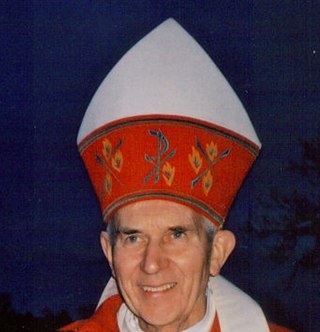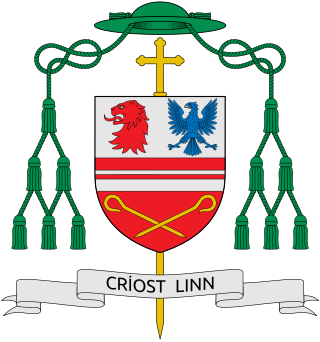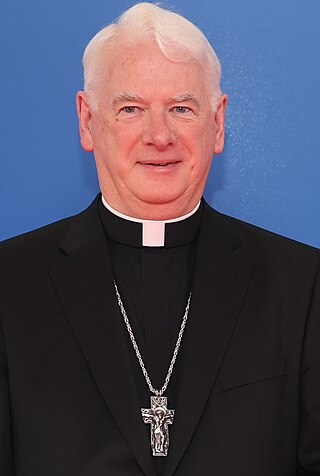Related Research Articles
Cahal Brendan Cardinal Daly KGCHS was a Roman Catholic prelate, theologian and writer from Northern Ireland.

William John Cardinal Conway was an Irish cardinal of the Roman Catholic Church who served as Archbishop of Armagh and Primate of All Ireland from 1963 until his death, and was elevated to the cardinalate in 1965. He was head of the Catholic Church in Ireland during the reforms of the Second Vatican Council.
William Crolly was the Bishop of Down and Connor from 1825 to 1835, and the Roman Catholic Archbishop of Armagh from 1835 to 1849.

Patrick Joseph Walsh is an Irish prelate of the Roman Catholic Church. From 1991 until 2008 he was the 31st Bishop of Down & Connor.
Anthony J. Farquhar was an Irish Catholic prelate who was the Auxiliary Bishop of the Diocese of Down and Connor.
Denis O'Beirne Faul, was an Irish Roman Catholic priest best known, in the course of the Northern Ireland Troubles, for publicising security-force abuses and, controversially among Irish republicans, for his role, with the families of prisoners, in bringing to an end the 1981 Irish Hunger Strike. In 1995, his church awarded him the honorific title of Monsignor.

John Kirby is a prelate of the Catholic Church who was the Bishop of Clonfert from 1988 to 2019.

Our Lady and St Patrick's College, Knock, known locally as Knock or OLSPCK, is a Catholic diocesan grammar school in Knock in the east of Belfast in Northern Ireland. The school, with an expanding enrolment, announced in late 2019 it anticipated future enrolment of 1,330.
Bishop Daniel Mageean D.D. 6 May 1882 – 17 January 1962 was an Irish Roman Catholic Prelate and until 1962 he held the title Lord Bishop of Down and Connor.

Henry Henry was an Irish Roman Catholic Prelate and from 1895 until 1908 he held the title Lord Bishop of Down and Connor. He was known for his energy and zeal, as well as his overt activism in local politics, founding the 'Belfast Catholic Association'.
Hugh Gerard Connolly (b.1961) is an Irish Catholic priest. He is a parish priest in the diocese of Dromore and a former Aumônier des Irlandais at the Collège des Irlandais in Paris. He previously served as president of St Patrick's College, Maynooth, Ireland.
Patrick McAlister (1826–1895) was an Irish Roman Catholic Prelate and 24th Lord Bishop of Down and Connor.
John Tohill (1855–1914) was an Irish Roman Catholic Prelate and 26th Lord Bishop of Down and Connor.
Patrick Dorrian (1814–1885) was an Irish Roman Catholic Prelate and 23rd Lord Bishop of Down and Connor.
Cornelius Denvir (1791–1866) was an Irish Roman Catholic prelate, mathematician, natural philosopher and former Lord Bishop of Down and Connor. He is noted for ministering in Belfast amidst growing sectarian tension, taking a moderate and non-confrontational stance, to the annoyance of his pro-Catholic followers. He was also a professor at Maynooth College as well as Down and Connor Diocesan College, and was active in the local scientific community.

Noël Treanor is an Irish prelate of the Catholic Church who was appointed Apostolic Nuncio to the European Union with the personal title of archbishop on 26 November 2022. He was Bishop of Down and Connor in Ireland from 2008 to 2022.
The Most Rev. Dr John Healy (1841–1918) was an Irish clergyman of the Catholic Church. He served as Lord Bishop of Clonfert from 1896 to 1903 and as Lord Archbishop of Tuam from 1903 to 1918.

Alexander Aloysius "Alan" McGuckian SJ is a Roman Catholic prelate and theologian from Northern Ireland who has served as Bishop of Raphoe since 2017.
Niall Coll is an Irish Roman Catholic prelate and theologian who has served as Bishop of Ossory since 22 January 2023.
Francis Desmond Wilson (1925-2019) was an Irish Catholic priest and church dissident who in the course of the Northern Ireland Troubles embraced ideas and practice associated, internationally, with liberation theology. Active in working-class and Irish nationalist West Belfast, he defended the right of communities failed by the state to create “alternative education, alternative welfare, alternative theatre, broadcasting, theological and political discussion, public inquiries and much else”. More controversially, he did not condemn paramilitary groups when they presented themselves, in his words, as “alternative police and alternative armies”.
References
- ↑ Canning, Bernard (1988). Bishops of Ireland 1870-1987. Ballyshannon: Donegal Democrat. pp. 123/4. ISBN 1870963008.
- ↑ "Image" (PDF). maynoothcollege.ie. Retrieved 24 June 2021.
- ↑ "Patriotism By Most Rev. William J. Philbin, D.D. Bishop Of Clonfert". Ecatholic2000.com. 7 August 1957. Retrieved 24 June 2021.
- ↑ Fanning, Bryan (16 June 2016). Irish Adventures in Nation-Building. ISBN 9781526109279.
- ↑ "BBC One - Scene Around Six, 10/08/1971, The killing of Fr Hugh Mullan". Bbc.co.uk. Retrieved 24 June 2021.
- ↑ Wilson, Des (2005). The Way I see it: an Autobiography by Fr Des Wilson. Belfast: Beyond the Pale Publications. pp. 120–121. ISBN 1900960281.
- ↑ "Fr Des Wilson obituary: Priest who fought oppression and injustice in North". The Irish Times. 7 December 2019. Retrieved 17 August 2023.
- ↑ Berman, David; Lalor, Stephen; Torode, Brian (1983). "The Theology of the IRA". Studies: An Irish Quarterly Review. 72 (286): (137–144), 138. ISSN 0039-3495.
- ↑ Gallagher, Eric; Worrall, Stanley (1982). Christian in Ulster 1968-1980. Oxford University Press. p. 95. ISBN 0192132377.
- ↑ Dillon, Martin (1997). God and the Gun: The Church and Irish Terrorism. London: Orion. pp. 93–94, 115. ISBN 9780752810379.
- ↑ "How parents taught the bishops a lesson - BelfastTelegraph.co.uk". Archived from the original on 16 April 2018. Retrieved 16 April 2018.
- ↑ Jonathan Bardon (29 December 2007). "'Armagh Three' dealt blow to education reform". Irishtimes.com. Retrieved 24 June 2021.
- ↑ "The Living Church". 1978.
- ↑ "School Revision Plan Stirs Furor in Ulster - The New York Times". The New York Times . 5 August 1976. Retrieved 24 June 2021.